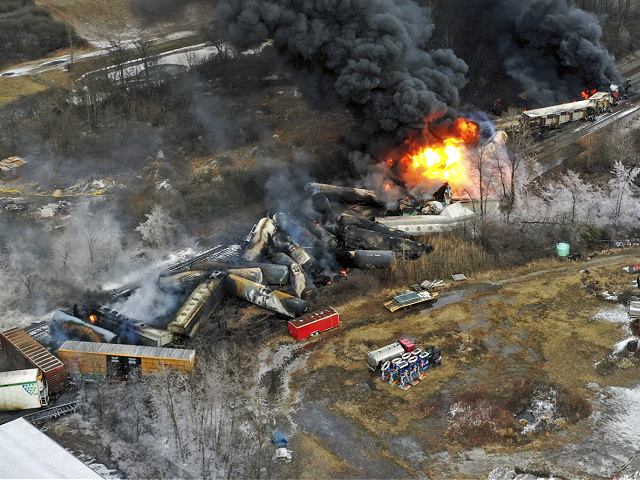Sen. J.D. Vance (R-OH) pitched Senate Republican colleagues on legislation to improve rail safety following the devastating train derailment and “controlled’ chemical burn in East Palestine, Ohio, Breitbart News can exclusively reveal.
In the aftermath of the accident, Sens. Vance, Josh Hawley (R-MO), Marco Rubio (R-FL), John Fetterman (D-PA), Bob Casey (D-PA), and Sherrod Brown (D-OH), introduced the Railway Safety Act of 2023.
Although the legislation has wide support from Democrats and Republicans, conservatives and progressives, it does not currently have the support necessary to pass through the Senate. To rectify that, Vance circulated the memo to Senate Republicans colleagues on the benefits of the bill and sought to alleviate any concerns that GOP lawmakers may have about the bill.
In a fact-check document circulated to Senate Republicans, which was obtained by Breitbart News, the document said the bill is “predicated on the idea that an efficient safety margin for an individual firm or industry may not be efficient for the nation as a whole. Government action is at times required to rectify these market failures.”
Vance has sought to strike a balanced approach to avoid another disastrous train derailment such as the one in East Palestine, while not burdening the railway industry with onerous regulations.
Watch: J.D. Vance on the ground in East Palestine after the derailment:
Video Source: Alana Mastrangelo / Breitbart NewsIn short, the legislation, according to the Vance fact-check document:
- applies elements of the current regime for High Hazard Flammable Trains, such as restrictions on train length, routing and notification requirements, to other hazardous material trains.
- creates minimum time requirements for human inspections as well as an auditing regime for inspections to be conducted by the Department of Transportation, while protecting the right of the Department to run pilot programs on automated track and rolling stock inspection systems.
- requires wayside bearing defect detectors (bearing failure was the cause of the derailment) every ten miles.
- requires a two-man crew on trains operated by Class I freight railroads, with some exceptions.
- increases in the civil penalties for violations of rail safety regulations.
- funds research and training for first responders, as well as research into rail safety.
To alleviate the claim the bill gives too much power to the Transportation secretary, the claim noted that the legislation largely mirrors the FAST Act, the current highway bill, and that the FAST Act’s Hazardous Materials Transportation Improvement Act was also passed with strong bipartisan majorities in the wake of another catastrophic derailment.
The Railway Safety Act of 2023 allows for the implementation of the National Transportation Safety Board’s (NTSB) 2014 recommendation to the definition of high-hazard flammable trains (HHFTs):
Notification of first responders, and questions about route analysis, planning, and labelling directly obtain on the events of East Palestine, where many first responders were not aware of the specific properties of the chemical they were dealing with and some placarding was either damaged or made illegible by fire. As the National Transportation Safety Board stated in 2014, “We believe the definition of HHFT should include a broad range of hazardous materials.”
Right now this designation applies only to flammable liquids, not gases like vinyl chloride. The Railway Safety Act of 2023 allows for the implementation of that recommendation. The debate about the propriety of the controlled burn adds further importance to the creation of a new notification requirement; if indeed as some suggest this event did not need to occur, or the controlled explosion was ill-advised, then notification and advanced planning are even more critical for first responders across all types of hazardous material classes.
To assuage conservatives’ concerns that the bill might take a too regulatory approach towards the environmental disaster, Vance said that the bill seeks to address a market failure:
Conservatives should not permit these communities to be erased from the map by an environmental disaster. That remediation will be costly, and it makes more sense to achieve prevention on the front end of a calamity than remediation after the fact.
These regulations remedy a market failure. If what is efficient for a railroad is a razor-thin margin of safety, it does not follow that that razor-thin margin is efficient for the country-at-large. Policymakers have a right and responsibility to address this issue to strike the right balance.
Rep. Troy Nehls (R-TX), who leads the House Transportation rail panel, said, “The rail industry has a very high success rate of moving hazardous material — to the point of 99-percent-plus. Let’s not have more burdensome regulations and all this other stuff.”
To persuade those who might think that the bill is taking action too quickly, Vance noted that a typical NTSB report takes roughly 18 months:
If, as some suggest, the industry has a 99.9 percent success rate, probability suggests that there could be at least one, possibly two, significant derailments and releases during that period. There has been another derailment in the state of Ohio already, mercifully without the release of hazardous material. There was also another fatal accident on March 7. Many of these provisions reflect
recommendations offered by the National Transportation Safety Board in response to previous derailments. At this point, given the roll call of previous disasters, it’s clear that there are insufficient regulations on the transportation of flammable gases and other materials.…
Norfolk Southern’s CEO stated, “Reading the NTSB report makes it clear that meaningful safety improvements require a comprehensive industry effort that brings together railcar and tank car manufacturers, railcar owners and lessors, and the railroad companies. We are eager to help drive that effort and we are not waiting to take action.” Even the railroad in question agrees that now is the time for action.
Sen. John Thune (R-SD), the second-ranking Senate Republican, said, “We’ll take a look at what’s being proposed, but an immediate quick response heavy on regulation needs to be thoughtful and targeted.”
“Let’s define the problem. Let’s figure out what the solutions are and if there are things we need to fix, we’ll fix them,” he added.

File/This photo taken with a drone shows portions of a Norfolk Southern freight train that derailed in East Palestine, Ohio, are still on fire at mid-day Saturday, Feb. 4, 2023. (AP Photo/Gene J. Puskar)
“You don’t have to wait on NTSB to know that our first responders deserve to know what’s on these trains in the first place,” Vance said last week.
To those that would say that this bill would make America less competitive, Vance noted that America has far more train derailments than other industrialized nations:
Derailments in the United States are much more common than in other countries. In 2019, 1,338 derailments took place in the US over about 777 million train kilometers. The EU, by contrast, only saw seventy-three derailments that year in spite of the fact that there were more than 4 billion rail kilometers travelled that year. In Japan, there were 2 billion train kilometers, and only nine derailments. Railroads in other developed countries are generally substantially less accident-prone.
The Railway Safety Act also has the support of the largest rail worker union in the country. SMART-TD President Jeremy Ferguson called on Congress to quickly pass the bill “without being watered down by negotiations or the special interests that will seek to stop it and claim that it is too ‘burdensome’ for a highly profitable industry to implement.”
Vance told the Hill on Monday that the bill has significant hurdles to overcome, which include the final NTSB report and opposition from the railway lobby. However, he countered, “I actually think there’s something to be done here.”
Sean Moran is a policy reporter for Breitbart News. Follow him on Twitter @SeanMoran3.

COMMENTS
Please let us know if you're having issues with commenting.